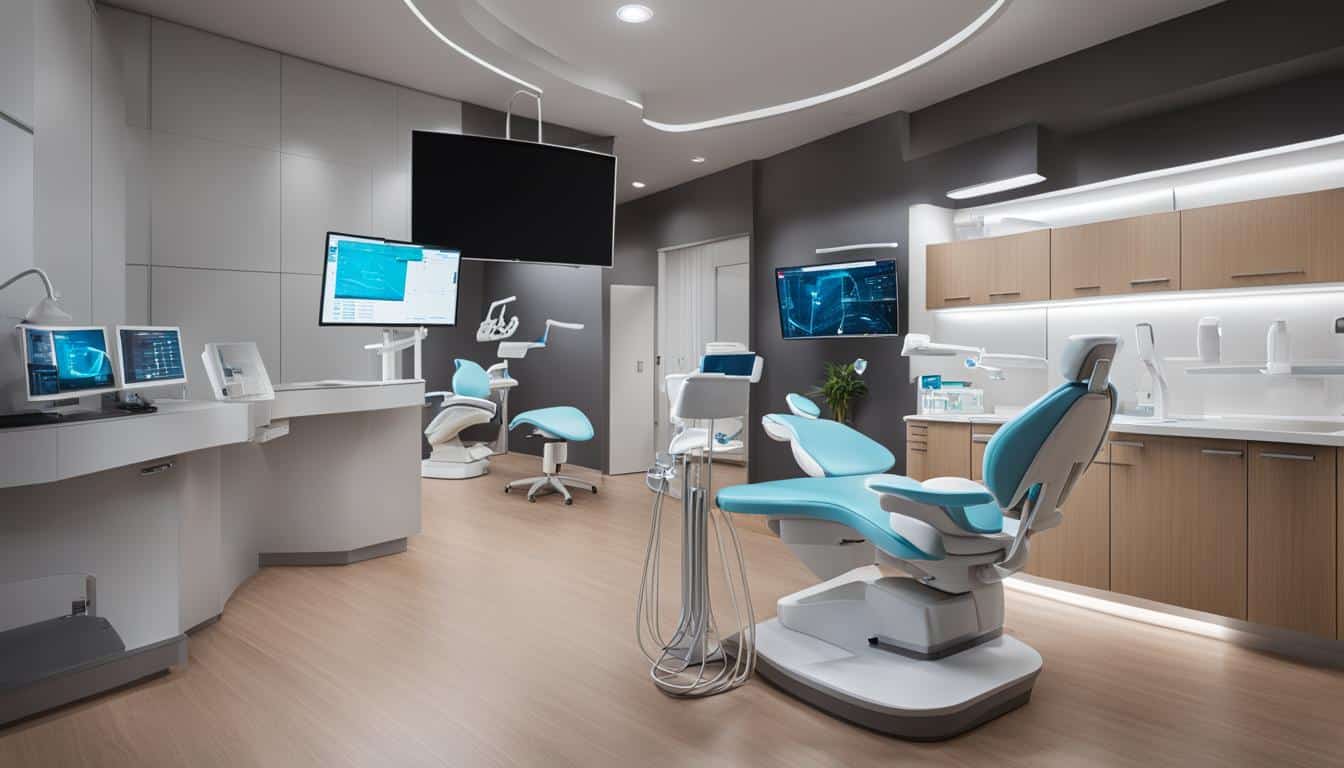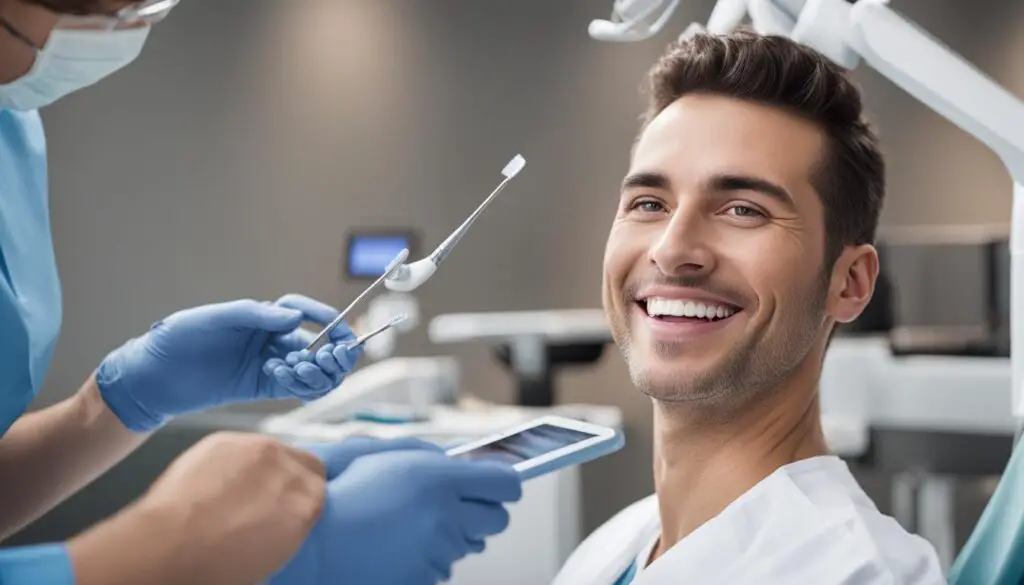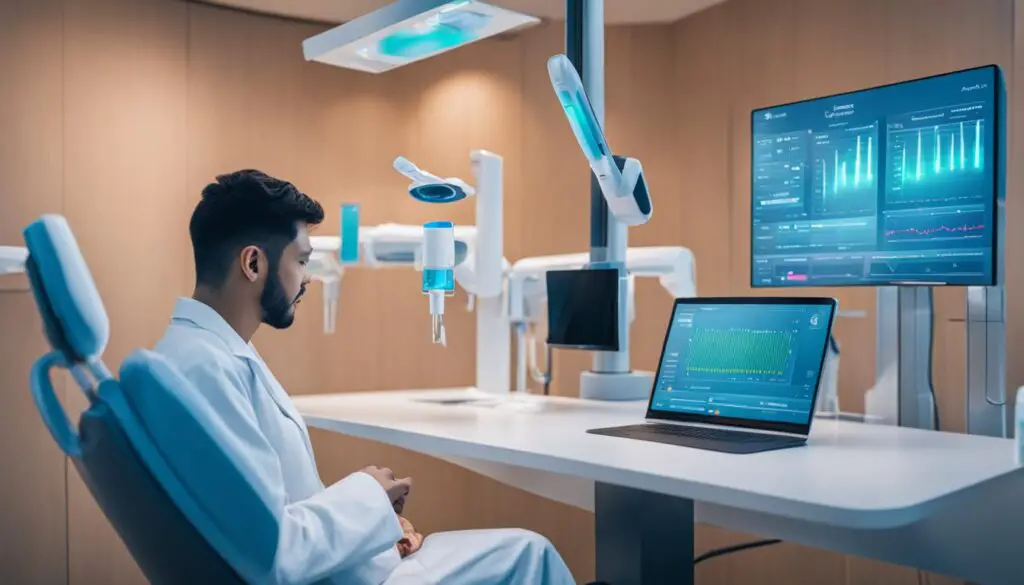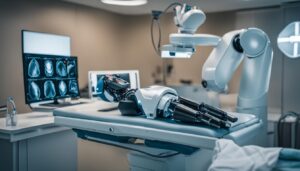
The use of artificial intelligence (AI) has revolutionized dental care and diagnosis. With advancements in AI technologies, dentists now have powerful tools at their disposal to enhance patient outcomes and improve the accuracy of diagnoses. From AI-powered imaging analysis to predictive analytics, AI is transforming the field of dentistry. Let’s explore the various ways in which AI is being used in dental care innovations.
Key Takeaways:
- AI has transformed dental care and diagnosis, providing enhanced patient outcomes and improved accuracy.
- AI algorithms can analyze dental images and accurately detect various conditions, leading to improved diagnostics.
- AI-assisted treatment planning and prosthetic development optimize treatment outcomes.
- AI-based patient monitoring and oral hygiene management improve oral health and prevent complications.
- The future of AI in dentistry holds promise for even more precise diagnostics and personalized treatment approaches.
AI in Dental Imaging and Diagnosis
AI-powered dental imaging and diagnosis have revolutionized the field of dentistry, providing dentists with advanced tools to improve patient care and enhance diagnostic accuracy. By leveraging AI algorithms, dental professionals can analyze dental radiographs and other images to detect and diagnose various dental conditions with exceptional precision.
These AI algorithms are capable of analyzing and interpreting images more efficiently and accurately than human dentists, enabling them to identify issues such as cavities, periodontal diseases, and even tumors. With the ability to analyze a vast amount of data in a short period, AI-powered imaging systems offer significant advantages in diagnosing complex dental cases.
One of the key benefits of AI in dental imaging is improved diagnostics and treatment planning. By using AI algorithms, dentists can make more accurate diagnoses and develop personalized treatment plans based on the analysis of the obtained images. This not only increases the effectiveness of treatments but also helps in reducing patient discomfort and improving overall treatment outcomes.
Furthermore, AI-powered software is being developed to assist dentists in the early detection and classification of oral cancers. By analyzing dental radiographs and other relevant data, these AI algorithms can identify suspicious patterns or indicators of oral cancer, enabling timely intervention and improving patient outcomes.
With the advancements in AI algorithms and dental imaging technologies, the future of dental care looks promising. Dentists will be able to leverage the power of AI for more accurate and efficient diagnosis, leading to improved patient care and outcomes. While AI cannot replace the expertise of dental professionals, it can serve as a valuable tool in assisting them in making more informed decisions and providing the best possible care to their patients.
AI in Treatment Planning and Prosthetics
In addition to diagnosis, AI is playing a significant role in treatment planning and the development of prosthetics in the field of dentistry. The advancements in AI-assisted treatment planning software have transformed the way dentists analyze patient data, including imaging results and medical history, to create personalized treatment plans. This technology optimizes treatment outcomes by considering various factors such as tooth alignment, occlusion, and bone density, ensuring precise and effective treatment.
Moreover, AI-guided prosthetic design and fabrication have revolutionized restorative dentistry. With the assistance of AI, the production of dental restorations like crowns and dentures has become more precise and efficient. By leveraging the power of AI, dentists can achieve superior accuracy in designing and fabricating prosthetics, leading to improved patient comfort and satisfaction.
On another note, digital smile design is gaining immense popularity with the help of AI. This technology enables dentists to simulate and customize smile makeovers for patients, creating a visually appealing result tailored to individual preferences. Digital smile design empowers patients to visualize their new smile before initiating any treatment, leading to enhanced patient communication and satisfaction.

In conclusion, AI is transforming treatment planning and prosthetics in dentistry, providing dentists with powerful tools to deliver personalized, accurate, and aesthetically pleasing results. The integration of AI-assisted treatment planning, AI-guided prosthetics, and digital smile design in dental practices is revolutionizing the field, ensuring optimal patient outcomes and satisfaction.
AI in Patient Monitoring and Oral Hygiene Management
AI is revolutionizing patient monitoring and oral hygiene management in dental care. Through the development of smart dental devices, AI technology has the capability to track and monitor patients’ oral hygiene habits with precision. These smart devices can capture data on brushing technique, frequency, and other oral care activities. By analyzing this data using AI algorithms, dentists and patients can gain valuable insights and receive personalized recommendations for improving oral health and preventing dental issues.
One of the key advantages of AI-based patient monitoring is its ability to detect potential oral health problems at an early stage. AI-powered devices can alert patients and dentists to signs of tooth decay, gum inflammation, or other issues that may require immediate attention. This early intervention can help prevent further complications and ensure timely treatment.
Furthermore, AI-powered oral hygiene tracking allows for a more proactive approach to oral care. Patients can monitor their progress and track their oral hygiene habits over time using smart dental devices. This data-driven approach empowers individuals to take control of their oral health and make informed decisions about their dental care routine.
“AI-based patient monitoring and oral hygiene tracking provide valuable insights, empowering individuals to take control of their oral health.”
Additionally, AI in patient monitoring has the potential to improve communication and collaboration between dentists and patients. By leveraging AI technology, dentists can remotely monitor patient data, provide real-time feedback, and offer personalized guidance. This virtual connection allows for more frequent check-ins and ensures that patients receive continuous support in maintaining optimal oral health.
The integration of AI technology in patient monitoring and oral hygiene management represents a significant advancement in dental care. By harnessing the power of AI, dentists can provide more personalized care, improve patient outcomes, and ultimately, enhance the overall experience for patients.

The Benefits of AI in Patient Monitoring and Oral Hygiene Management
AI-based patient monitoring and oral hygiene management offer several benefits for both dentists and patients:
- Personalized recommendations for improving oral health and preventing dental issues
- Early detection of oral health problems for timely intervention
- Empowerment of patients to take control of their oral health through data-driven insights
- Improved communication and collaboration between dentists and patients
- Enhanced patient experience and satisfaction
- Optimized treatment planning based on real-time patient data
The future of AI in dental care holds immense potential for further advancements in patient monitoring and oral hygiene management. As technology continues to evolve, the integration of AI-based solutions will undoubtedly contribute to improved oral health outcomes and a more proactive approach to dental care.
Conclusion
The advancements in AI technologies have revolutionized the field of dentistry, bringing numerous benefits to dental care. Through the integration of AI-powered algorithms and devices, dentists now have access to powerful tools that enhance diagnostics, treatment planning, patient monitoring, and oral hygiene management.
One of the key benefits of AI in dental care is the improvement in diagnostic accuracy. AI algorithms can analyze dental radiographs and other images more efficiently and accurately than human dentists, leading to enhanced diagnostics and treatment planning. This has the potential to significantly improve patient outcomes and ensure more effective treatments.
The future of AI in dentistry is promising, with continued research and advancements. With further developments, we can expect even more precise diagnostics and personalized treatment approaches. AI will continue to play a transformative role in dental care innovations, shaping the future of oral healthcare.
FAQ
How is AI being used in dental care innovations?
AI is being used in various ways in dental care innovations, such as dental imaging and diagnosis, treatment planning and prosthetics, and patient monitoring and oral hygiene management.
How does AI help in dental imaging and diagnosis?
AI algorithms can analyze dental radiographs and other images to detect and diagnose dental conditions accurately. They can identify cavities, periodontal diseases, tumors, and even aid in the detection and classification of oral cancers.
What is the role of AI in treatment planning and prosthetics?
AI-assisted treatment planning software can analyze patient data and create personalized treatment plans based on factors like tooth alignment, occlusion, and bone density. AI-guided prosthetic design and fabrication revolutionize restorative dentistry, allowing for precise and efficient production of dental restorations and digital smile design.
How does AI contribute to patient monitoring and oral hygiene management?
With smart dental devices, AI can track and monitor patients’ oral hygiene habits, provide personalized recommendations for improving oral health, and alert patients and dentists to potential dental issues early on, preventing further complications.
What are the benefits and future of AI in dentistry?
The use of AI in dental care has led to improved diagnostics, treatment planning, patient monitoring, and oral hygiene management. With continued advancements, AI has the potential to further enhance diagnostics and treatment approaches, shaping the future of oral healthcare.
Source Links
- https://wellsvillesun.com/blog/2024/01/09/governor-hochul-makes-state-of-the-state-annual-address-read-highlights/
- https://medriva.com/cancer/deepening-understanding-of-rare-leukemia-insights-into-myeloid-natural-killer-cell-precursor-acute-leukemia/
- https://sg.news.yahoo.com/no-not-taylor-swift-peddling-183112998.html








